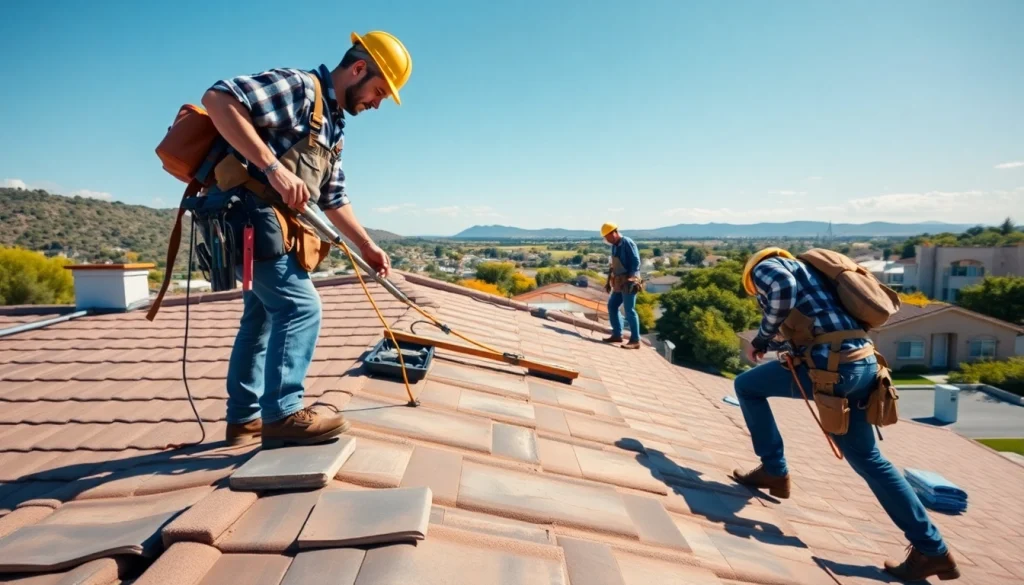Understanding the Role of Local Roofers Near Me
When it comes to maintaining the integrity of your home, finding reliable local roofers near me can be an essential step. Local roofers offer services tailored to the specific needs of your community, understanding the local climate and building codes. This article delves deeper into the services typically provided by local roofers, the significance of choosing someone from your area, common issues they address, and how to identify the right contractor for your needs.
What Services Do Local Roofers Typically Offer?
Local roofing companies provide a wide array of services aimed at ensuring your roof remains functional and aesthetically pleasing. Here are the primary services:
- Roof Inspections: Regular inspections are crucial for identifying potential issues before they escalate into costly repairs. Local roofers can evaluate your roof’s condition and advise on necessary maintenance.
- Roof Repairs: Whether it’s a minor leak or major storm damage, local roofers are equipped to handle repairs swiftly to prevent further damage to your home.
- Roof Replacement: When repairs are no longer viable, local roofers can manage the replacement process, helping you choose materials that fit your budget and needs.
- Roof Maintenance: Ongoing maintenance contracts may include regular inspections and cleaning services that extend the lifespan of your roof.
- Installation of Roofing Accessories: This includes gutters, ventilation systems, and skylights that enhance your roof structure’s functionality.
Why Choosing Local Matters
Choosing local roofers has significant advantages over larger, national chains. Local roofers are deeply embedded in your community. They understand the specific weather conditions and the typical roofing styles prevalent in your area. Here are several reasons why local roofers often hold an edge:
- Familiarity with Local Regulations: Local roofers are aware of building codes and permit requirements in your area, which can save you time and potential legal issues.
- Community Reputation: Local companies rely heavily on their reputation within the community. They are motivated to provide high-quality service to retain their customers and build lasting relationships.
- Quick Response Times: Since local roofers are nearby, they can respond more quickly in emergencies, minimizing potential damage.
Common Issues Local Roofers Address
Local roofers deal with various problems that often arise due to environmental factors. Some common issues include:
- Weather-Related Damage: Harsh weather conditions, including heavy rain, snowfall, and winds, can lead to leaks and structural damages that require urgent repairs.
- Improper Installation: Poor installation practices from previous contractors can result in serious problems. Local roofers can identify these issues and rectify them effectively.
- Wear and Tear: Over time, roofs can deteriorate due to exposure to the elements. Local roofers can provide maintenance and replacement services as needed.
How to Find Reliable Local Roofers Near Me
Finding a reliable roofer can be daunting, but a systematic approach can simplify the process. Here are some effective strategies:
Online Reviews and Recommendations
One of the best ways to evaluate local roofers is through online reviews and testimonials. Websites like Angie’s List, Yelp, and Google Reviews can provide insights into other customers’ experiences. Look for comments about:
- Quality of work
- Timeliness of service
- Customer service and communication
- Pricing transparency
Additionally, ask friends, family, and neighbors for recommendations to gauge which local roofers have built a solid reputation in your area.
Comparing Estimates from Different Roofers
Once you’ve shortlisted potential roofers, it’s important to gather multiple estimates. Here’s how to approach this:
- Request Detailed Proposals: Ensure each estimate includes detailed information on materials, labor costs, timelines, and warranty provisions. This allows for easier comparison.
- Beware of Low Bids: If one estimate is significantly lower than others, it may indicate subpar materials or work. Be cautious and inquire further.
- Consider Value Over Cost: The cheapest option may not always be the best. Evaluate overall value, including experience, qualifications, and customer reviews.
Assessing Credentials and Experience
Before making a final decision, verify the roofers’ credentials:
- Licensing and Insurance: Check that the roofers are fully licensed and insured, protecting you from liability in case of accidents.
- Experience in Your Area: Look for roofers who have experience working on homes similar to yours and understand the particular issues that may arise in your locality.
- Better Business Bureau Ratings: Consult the BBB for ratings and customer complaints to gauge the roofer’s reliability.
What to Expect from the Roofing Process
Understanding the roofing process helps manage expectations. Here’s a breakdown of typical stages:
Initial Inspection and Consultation
The first step is an inspection where the roofer assesses the roof’s condition. During the consultation, you should discuss:
- Your concerns and needs
- Possible solutions offered by the roofer
- Cost estimates and timelines
This phase is crucial for establishing rapport and ensuring mutual understanding of expectations.
Project Timeline and Requirements
Once you agree to the project, local roofers will provide a timeline that details each phase of the process, from material delivery to final inspection. Be proactive in asking about:
- Expected duration for each phase
- Potential disruptions during installation
- Regulatory requirements, including permits
Establishing clear communication during this stage is key to a smooth roofing experience.
Post-Installation Services and Warranties
After the roof installation, reputable local roofers will offer warranties covering both materials and workmanship. Ask about:
- The length of the warranty
- What it covers
- Post-installation maintenance recommendations
Reputable contractors typically provide inspections after a few months to ensure everything is holding up well.
Cost Considerations for Local Roofing Services
The cost of roofing projects can vary dramatically based on multiple factors. Understanding these can help you budget effectively:
Averaging Costs of Local Roofing Projects
On average, homeowners in the United States spend between $5,000 and $10,000 on roofing projects. However, costs can fluctuate based on:
- Roof size and pitch
- Materials chosen (asphalt shingles, metal roofing, tile, etc.)
- Location and labor costs
Getting multiple estimates can help you gauge if an estimate aligns with market averages.
Factors That Influence Roofing Prices
Specific aspects that can drive prices up or down include:
- Type of Roof: Specialty roofing types likely incur additional costs due to their materials and installation requirements.
- Accessibility: Roofs that are harder to access may increase labor costs.
- Structural Repairs: If the deck is damaged, further repairs will add to costs.
How to Secure Financing for Your Roofing Project
Financing options can alleviate the burden of upfront costs. Consider:
- Home Equity Loans: If you have equity in your home, this could be a reasonable way to finance significant projects.
- Personal Loans: Short-term loans may be useful for covering immediate costs, though interest rates can vary.
- Roofing Company Financing: Some roofing companies offer financing options with deferred or low-interest plans.
Always read the fine print before committing, ensuring you understand any terms associated with the financing.
Maintaining Your Roof After Installation
The completion of your roofing project does not mark the end of your responsibilities. Regular maintenance is key to prolonging the life of your roof.
Regular Inspection Routines with Local Roofers
Schedule annual inspections with your local roofers to catch small issues before they require extensive repairs. You should also inspect your roof following severe weather events. Key aspects to cover during inspections include:
- Identifying signs of wear, rot, or fungi
- Checking for missing or damaged shingles
- Examining seams and flashing around chimneys and ventilation systems
Understanding Roof Longevity and Repairs
Different roofing materials have varying lifespans. Understanding these can help you prepare for future replacement costs:
- Asphalt Shingles: 15-30 years
- Metal Roofing: 40-70 years
- Tile Roofing: 50+ years
Each material’s longevity will depend on climate conditions and maintenance frequency.
Enhancements to Improve Roofing Lifespan
Implementing enhancements such as adequate ventilation and using high-quality materials can improve your roof’s lifespan. Consider investing in:
- *Good Ventilation:* Proper airflow prevents moisture buildup, which can cause damage.
- *Upgrading to High-Quality Materials:* Higher-grade materials often come with longer warranties and better performance.
- *Regular Cleaning:* Keeping gutters and roofs clear of debris helps maintain drainage and prevent rot.
Conclusion: Finding reliable local roofers near you is crucial for ensuring your home remains protected. By understanding the services they offer, following best practices for hiring, being aware of costs, and maintaining your roof post-installation, you can safeguard your investment in your home. Local expertise not only ensures quality workmanship but also fosters trust and accountability, essential for long-term relationships between homeowners and contractors.


